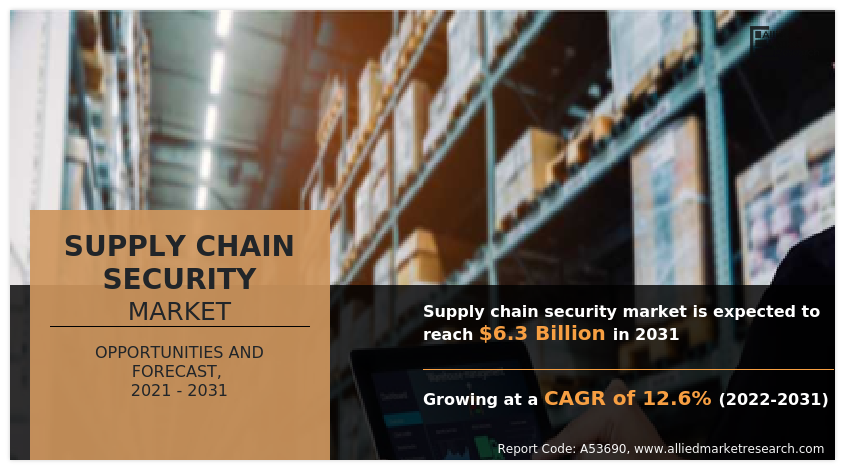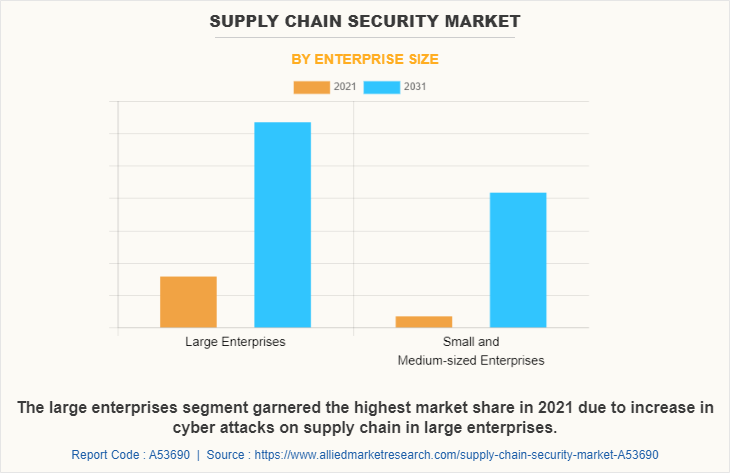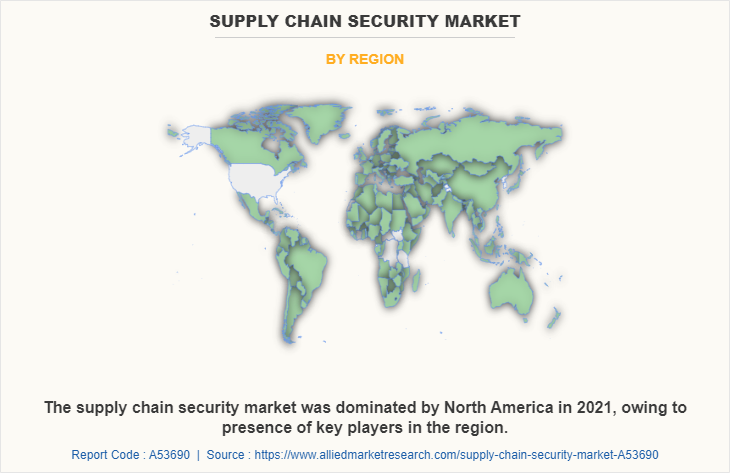Supply Chain Security Market Insights, 2031
The global supply chain security market size was valued at USD 2 billion in 2021, and is projected to reach USD 6.3 billion by 2031, growing at a CAGR of 12.6% from 2022 to 2031.
The supply chain security market refers to the industry that focuses on protecting the flow of goods and materials throughout the supply chain, from manufacturing to distribution and delivery. This market includes a variety of products and services designed to enhance the security of the supply chain, such as security software, physical security solutions, and risk management services.

Furthermore, as supply chains become more complex and involve more players across different regions, there is a greater need to ensure the security of the supply chain at every stage, from sourcing raw materials to delivering finished products. Therefore, there is a need for companies to implement supply chain security measures to protect their products, data, and reputation. This includes implementing security protocols and procedures, such as secure transportation and storage, data encryption, and cyber threat monitoring.
Moreover, companies that are found to have unethical or unsustainable practices in their supply chains can face significant damage to their reputation and financial consequences. Therefore, to address these concerns, many companies are investing in supply chain security solutions that enable greater transparency and sustainability. This includes implementing traceability systems, conducting regular audits of suppliers, and establishing codes of conduct for suppliers to follow. Thus, such factors are likely to propel the growth of the supply chain security market to new heights.
However, implementing security measures throughout the supply chain can be expensive, especially for smaller companies that may not have the resources to invest in expensive security technology, personnel, and training. Moreover, the cost of supply chain security measures may be perceived as an additional expense rather than a strategic investment, which hampers the growth of the market. On the contrary, new technologies such as blockchain, Internet of Things (IoT), and artificial intelligence (AI) help to enhance the security and transparency of the supply chain security market. Furthermore, the adoption of new technologies can help businesses increase efficiency and reduce costs, which can further drive demand for this market.
Segment Review
The supply chain security market is segmented on the basis of component, security type, enterprise size, end user and region. By component, it is classified into hardware, software, and services. By security type, it is categorized into data protection, data visibility & governance, and others. By enterprise size, it is bifurcated into large enterprises and small & medium enterprises. By end user, it is divided into FMCG, retail & e-commerce, healthcare, manufacturing, transportation & logistics, and others. By region, it is analyzed across North America, Europe, Asia-Pacific, and LAMEA.

By region, North America registered the highest revenue in supply chain security market share in 2021 as the market growth for supply chain security in the region is being driven by the increase in the adoption of advanced technologies such as blockchain, artificial intelligence (AI), and the Internet of Things (IoT) that secure the supply chain. Moreover, the rise in demand for secure & reliable supply chains, government regulations & initiatives, and the adoption of advanced technologies foster the growth of the market in North America. However, Asia-Pacific is expected to be the fastest-growing region during the forecast period. This is due to the region's expanding economies, increasing trade volumes, and growing demand for secure and efficient supply chain operations. Thus, these factors propel the supply chain security market growth in Asia-Pacific.

By enterprise size, the large enterprises segment attained the highest market share in 2021. This is due to the fact that the large enterprises segment typically has complex supply chains that involve multiple suppliers, vendors, and partners, making them vulnerable to a wide range of security threats. Thus, adoption of supply chain security solutions is helping companies to enhance their visibility into their supply chains and to automate and optimize their security processes.
However, the small and medium-sized enterprises segment is considered to be the fastest-growing segment in supply chain security market forecast. As now-a-days SMEs are adopting a range of technologies and practices to improve supply chain security, including implementing secure communication channels, conducting supplier assessments and audits, and using data analytics tools to monitor and identify potential security threats. Thus, the use of supply chain security solutions is becoming increasingly important for SMEs as they seek to compete in an increasingly globalized and complex business environment.
Top Impacting Factors
Increased Complex and Globalized Supply Chains
The increasing complexity and globalization of supply chains a major drivers for the supply chain security market. As supply chains become more complex and involve more players across different geographies, there is a greater need to ensure the security of the supply chain at every stage, from sourcing raw materials to delivering finished products. Furthermore, the globalization of supply chains means that companies are sourcing materials and components from different countries and continents, which can increase the risk of supply chain disruptions, such as political instability, natural disasters, or transportation issues.
Additionally, as supply chains become more complex, they also become more vulnerable to cyber threats, counterfeiting, and theft. Therefore, companies need to implement supply chain security measures to protect their products, data, and reputation. This includes implementing security protocols and procedures, such as secure transportation and storage, data encryption, and cyber threat monitoring, as well as investing in technologies such as blockchain and IoT to enhance supply chain visibility and control.
Growing Demand for Transparency and Sustainability
Supply chain security is a critical component of transparency and sustainability, as it helps to ensure that products are produced ethically and sustainably throughout the supply chain. This includes ensuring that raw materials are sourced responsibly, that labor practices are fair and safe, and that environmental standards are met. Furthermore, now-a-days companies that can demonstrate transparency and sustainability in their supply chains are increasingly seen as more trustworthy and are often rewarded with customer loyalty and a positive brand reputation. Conversely, companies that are found to have unethical or unsustainable practices in their supply chains can face significant damage to their reputation and financial consequences.
Therefore, to address these concerns, many companies are investing in supply chain security solutions that enable greater transparency and sustainability. This includes implementing traceability systems, conducting regular audits of suppliers, and establishing codes of conduct for suppliers to follow. Overall, the growing demand for transparency and sustainability is driving the need for stronger supply chain security measures. As consumers and stakeholders continue to demand greater transparency and accountability from companies, the importance of supply chain security in achieving these goals is likely to increase in the coming years.
High Implementation Cost
Implementing security measures throughout the supply chain can be expensive, especially for smaller companies that may not have the resources to invest in expensive security technology, personnel, and training. Moreover, the cost of supply chain security measures may be perceived as an additional expense rather than a strategic investment. Companies may prioritize other areas, such as marketing and sales, over security, which can lead to a lack of demand for supply chain security solutions. Furthermore, the cost of supply chain security can be difficult to quantify, making it challenging for companies to justify the expense. The benefits of supply chain security, such as risk reduction and increased customer trust, may not be immediately evident, making it difficult to measure the return on investment. Thus, high investing costs act as a restraint for the supply chain security Industry.
Complexity of Supply Chain Security
Supply chains can be complex, involving multiple stakeholders, processes, and touchpoints, which can make implementing security measures challenging. For instance, a typical supply chain may involve numerous suppliers, manufacturers, distributors, and retailers, each with their own unique security requirements and challenges. Additionally, supply chains can span multiple geographies, adding further complexity to the security landscape. Furthermore, supply chain security is not a one-size-fits-all solution. Therefore, different industries, businesses, and supply chains have unique security requirements, which can add to the complexity of implementing effective security measures.
Furthermore, there is a need for continuous monitoring and assessment of supply chain security risks, which can be time-consuming and resource intensive. This can make it difficult for businesses to stay up to date with the latest threats and vulnerabilities. Thus, this factor leads to restraining the growth of the market.
Adoption of New Technologies
New technologies such as blockchain, Internet of Things (IoT), and artificial intelligence (AI) can help enhance the security and transparency of the supply chain. For instance, blockchain technology can provide a secure, tamper-proof record of transactions and events in the supply chain, which can help to prevent fraud, counterfeiting, and other security threats. Furthermore, IoT sensors can be used to track and monitor goods in real-time, providing visibility and transparency throughout the supply chain.
Additionally, AI algorithms can also help to analyze data from multiple sources to detect anomalies and potential security threats, allowing businesses to take proactive measures to prevent disruptions. Further, as the importance of supply chain security continues to increase, businesses are looking for innovative solutions to help them protect their supply chains. Thus, this presents a significant opportunity for technology companies that can develop and implement these new technologies to enhance supply chain security. Furthermore, the adoption of new technologies can help businesses increase efficiency and reduce costs, which can further drive demand for this market.
Regional Insights
North America
North America leads the supply chain security market due to a strong emphasis on technological advancements and stringent regulatory standards. The U.S. is a major player, with significant investments in cybersecurity measures and risk management. Increasing cyber threats, regulatory compliance, and the need for enhanced operational resilience. Adoption of AI and machine learning for predictive analytics, along with blockchain technology for transparency and traceability.
Europe
Europe is experiencing robust growth in supply chain security, driven by regulations such as GDPR and an increasing focus on data protection. Regulatory frameworks, rising cybercrime, and the need for secure supply chain practices across sectors like automotive, pharmaceuticals, and food. Integration of advanced security protocols and enhanced collaboration between public and private sectors to secure supply chains.
Asia-Pacific
The Asia-Pacific region is rapidly adopting supply chain security measures, fueled by expanding manufacturing sectors in countries like China and India. Growth of e-commerce, globalization of supply chains, and increasing awareness of cybersecurity threats. Implementation of IoT devices for real-time monitoring and analytics, along with government initiatives to promote supply chain resilience.
Middle East & Africa
The Middle East is focusing on enhancing supply chain security, particularly in industries like oil and gas and logistics. Economic diversification efforts, geopolitical risks, and the need for robust security frameworks. Investment in advanced monitoring technologies and collaboration with international partners to strengthen supply chain security.
Latin America
Latin America is gradually increasing its focus on supply chain security, particularly in logistics and transportation sectors. Rising incidents of cargo theft and regional security threats. Adoption of RFID and GPS technologies for tracking and securing shipments, along with enhanced regulatory measures.
Key Industry Developments
- September 2023: IBM launched a suite of tools leveraging AI and blockchain to enhance visibility and security across supply chains, helping businesses identify and mitigate risks more effectively.
- August 2023: SAP and Honeywell partnered to integrate IoT technologies into supply chain operations, providing enhanced monitoring and risk management capabilities.
- July 2023: Cisco announced updates to its cybersecurity offerings, focusing on supply chain vulnerabilities, with new solutions designed to protect against emerging threats.
- June 2023: Maersk introduced new digital security protocols to safeguard its shipping and logistics networks, emphasizing the importance of cybersecurity in global trade.
- In April 2023, Microsoft expanded its Azure platform to include advanced security tools specifically for supply chain management, aiming to help businesses enhance their resilience against cyber threats.
Market Landscape and Trends
The supply chain security market is expected to see continued growth in the coming years, driven by a range of factors including increase in globalization, rise in security threats, and the growth in adoption of new technologies such as blockchain and IoT. Moreover, one of the key trends in the market is the increasing emphasis on supply chain visibility and risk management, with many companies investing in solutions that enable real-time monitoring of supply chain operations and identification of potential risks.
Another trend is the emergence of new players offering innovative solutions to address emerging supply chain security challenges, such as the use of drones for delivery and monitoring. Looking to the future, the supply chain security market is expected to continue to evolve rapidly, with a greater focus on collaboration and information sharing between stakeholders, increased adoption of AI and machine learning technologies, and ongoing efforts to improve supply chain resilience and sustainability. Therefore, these are the major market trends of supply chain security market.
Key Benefits for Stakeholders
- This report provides a quantitative analysis of the market segments, current trends, estimations, and dynamics of the supply chain security market analysis from 2022 to 2031 to identify the prevailing supply chain security market opportunities.
- The market research is offered along with information related to key drivers, restraints, and opportunities.
- Porter's five forces analysis highlights the potency of buyers and suppliers to enable stakeholders to make profit-oriented business decisions and strengthen their supplier-buyer network.
- In-depth analysis of the supply chain security market segmentation helps determine the prevailing market opportunities.
- Major countries in each region are mapped according to their revenue contribution to the global market.
- Market player positioning facilitates benchmarking and provides a clear understanding of the present position of the market players.
Supply Chain Security Market Report Highlights
| Aspects | Details |
| Market Size By 2031 | USD 6.3 billion |
| Growth Rate | CAGR of 12.6% |
| Forecast period | 2021 - 2031 |
| Report Pages | 250 |
| By Component |
|
| By Security Type |
|
| By Enterprise Size |
|
| By Industry Vertical |
|
| By Region |
|
| Key Market Players | Check Point Software Technologies Ltd., SailPoint Technologies, Inc., IBM Corporation, NXP Semiconductors, Emerson Electric Co., Accenture, Tagbox, Controlant, Cold Chain Technologies, Omega Compliance |
Analyst Review
The supply chain security market refers to the companies and products that provide security solutions to protect the supply chain. These solutions help to prevent theft, fraud, and other malicious activities that can occur during the process of producing and delivering goods to customers. The market includes products such as security software and hardware, risk management services, and education and training programs. The demand for supply chain security solutions is growing due to increasing security threats and the need for greater transparency and efficiency in supply chain operations.
Furthermore, market players are adopting strategies such as collaboration for enhancing their services in the market and improving customer satisfaction. For instance, December 2022, Accenture, through its Accenture Ventures Project Spotlight initiative, has entered into a collaboration agreement with Planet Labs PBC, a leading provider of daily data and insights about Earth, to help power decision-making at organizations across myriad industries including agriculture, consumer packaged goods, energy, forestry, and government. Therefore, such strategies are anticipated to boost the growth of the market in upcoming years.
Moreover, some of the key players profiled in the report are Accenture, Check Point Software Technologies Ltd., Cold Chain Technologies, Controlant, Emerson Electric Co., IBM, NXP Semiconductors, Omega Compliance, SailPoint Technologies, Inc., and Tagbox. These players have adopted various strategies such as product development and partnership to increase their market penetration and strengthen their position in the industry.
The global supply chain security market was valued at $1,962.41 million in 2021, and is projected to reach $6,258.91 million by 2031.
The global supply chain security market is projected to grow at a compound annual growth rate of 12.6% from 2022 to 2031 to reach USD 6.3 billion by 2031
The key players operating in supply chain security market are Accenture, Check Point Software Technologies Ltd., Cold Chain Technologies, Controlant, Emerson Electric Co., IBM, NXP Semiconductors, Omega Compliance, SailPoint Technologies, Inc., and Tagbox.
North America is the largest regional market for Supply Chain Security Market.
The increase in complexity and globalization of supply chains and rise in demand for transparency & sustainability are the major growth factors for the supply chain security market.
Loading Table Of Content...
Loading Research Methodology...



